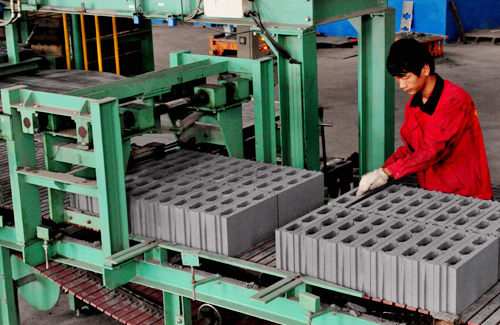|
 |
|
SHIFT TO ENERGY SAVING: A worker is on the assembly line producing hollow bricks, a new kind of wall material made of waste coal ash and scoria, at the Hengyuan New Material Co. Ltd. in the city of Liupanshui in west China's Guizhou Province, on October 19 (XINHUA) |
China wanted its gross domestic product (GDP) to drop moderately, which is needed for sound economic development. "Even a continued slow drop to 8 percent annually, China's economic growth will still lead the world," said Wu Xiaoling, Vice Chairman of the Financial and Economic Committee of the Standing Committee of the National People's Congress.
Slowdown to continue
China's GDP growth was at 9.1 percent year-on-year in the third quarter of 2011, showing slowdown for the third consecutive quarter compared with 9.5 percent in the second quarter and 9.7 percent in the first, according to recent data from the National Bureau of Statistics.
Many experts believe that China's economy is not at risk of a hard landing with the decreased inflation in the fourth quarter. Although the GDP in third quarter had a year-on-year decline, China's economy grew by 2.3 percent on a monthly basis. The figure indicated that domestic demand is fairly strong in spite of slowed growth.
"Economic slowdown will surely continue and the GDP in the fourth quarter will drop to between 8 percent and 9 percent," said Liu Yuhui, director of the Chinese Appraisal and Rating Center of the Institute of Finance and Banking under the Chinese Academy of Social Sciences.
As China was mainly supported by investment in state-owned enterprises and government investment in public projects over the past three years, investment slowdown will become an irreversible trend because of dual roles of active and passive factors.
"The active factor is that the Chinese Government realized that maintaining an economic growth rate merely depending on government investment is costly, unsustainable, and problematic," said Liu.
In the past, fast growth in exports diminished some negative aspects--excess capacity, redundant construction and low efficiency--resulting from government investment in public projects. Under the backdrop of globalization, consumption bubbles in Western countries have covered the excess capacity in China. However, the debt crisis in the United States and Europe made such problems to evident.
In terms of the passive factors, Liu said "Investment impulses of local governments were restrained by lack of funds because land income declined, and the central bank tightened the flow of credit funds." Against this situation, the Central Government has begun to downgrade GDP growth rate since May this year. The purpose is to release excess capacity and digest inventory in the fourth quarter this year and in the first six months next year.
Necessary
As China's inflation has been at a high level this year, the moderate downward economic growth rate proved that China's current macro-control policies have achieved initial results, which will not only help to ease inflationary pressure, but also make economic operation stable.
"Economic growth slowdown is not bad. It is necessary for China to enjoy sound economic development," said Liu. The current slumps in global prices for bulk materials has reduced costs, eased economic tensions, and reinvigorated manufacturing.
Under the current tightened monetary situation, government investment slowdown will save more capital resources. In this way, money shortages will be eased for local government departments, municipal institutions, and small- and medium-sized enterprises.
Investment slowdown will make room and time for economic transformation, financial system reform, and structural tax reduction, which will be able not only to slow down GDP growth rate, but also ease inflation, said Liu.
"GDP slowdown is beneficial for structural adjustment and transformation of the economic development mode in China," said Zhang Liqun, a researcher with the Development Research Center of the State Council.
Zhang said China is not suitable to adopt stimulus policies to push economic growth, and should maintain overall stability in policy making. "Focus should be put on accelerating adjustments to economic structure, shift the development mode, and speed up reform, so as to lay a sound foundation for a new round of economic growth," said Zhang.
More to be done
Wu Xiaoling deemed that more attention should be focused on reform of national income distribution instead of only GDP growth. "China should endeavor to drive common development of export, investment and domestic consumption, which will not work without national income distribution reform," Wu said.
Xu Hongcai, Deputy Director of the Information Department at the China Center for International Economic Exchanges, said China should make use of the opportunity when the country's economy is regulated to shift the economic growth pattern. China should change the old economic growth mode which depended heavily on foreign demand and high investment.
"China's economic growth mode should be gradually shifted from concern of growth of GDP to concern of quality and efficiency," said Xu.
Liu Yuhui said shifts in the economic growth mode will be complicated in China as the production service industry is rising. To complete the shift, China needs to make breakthroughs in the current economic system, including clearing obstacles like monopolies, government interference and government functional reform.
Liu said China's economy will not be landing hard as long as China sticks to economic structure reform, along with other monetary policies, industrial policies, and measures of structural regulation.
(Source: People's Daily Overseas Edition) | 